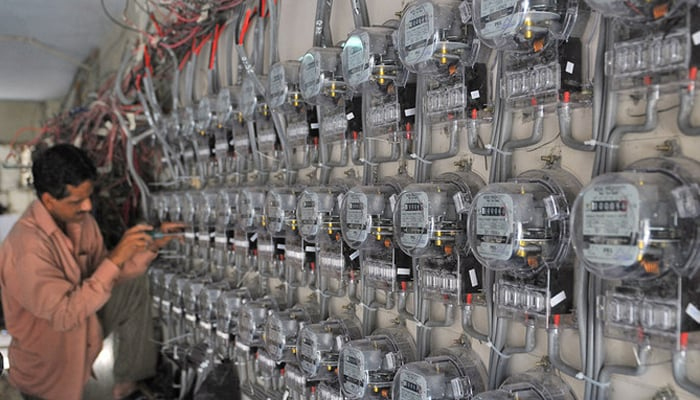Higher power tariffs affecting industry
High power tariffs in Pakistan have placed an enormous burden on energy-intensive industrial sectors that are the backbone of the economy
ISLAMABAD: Pakistan’s economic landscape is marked by an incredibly worrying trend: de-industrialisation, a phenomenon where industrial capacity is diminishing, leading to reduced manufacturing output and employment in the economy.
Since the second quarter of FY24 industrial power consumption, an important indicator of manufacturing activity, has been on a persistent decline. Central to this issue are continuously increasing power tariffs for industrial consumers—hovering at around 17 cents/kWh at present and expected to keep increasing—that have become a hallmark of the country’s energy sector.
High power tariffs in Pakistan have placed an enormous burden on energy-intensive industrial sectors that are the backbone of the economy. The cost of electricity directly influences production costs, competitiveness, and profitability. When energy prices soar, the immediate effect is an increase in operational costs for manufacturers. For most industries, this rise in cost cannot be fully passed on to consumers without risking a loss of market share to cheaper imported goods. Consequently, margins are squeezed, making it difficult for local industries to compete both domestically and internationally.
Moreover, high energy costs have a stifling effect on investment in the industrial sector. Prospective investors, both local and foreign, often cite energy costs as a significant deterrent to investment in Pakistan. The uncertainty surrounding energy prices, compounded by frequent changes in tariffs, fuel price adjustments, and quarterly tariff adjustments, exacerbates this reluctance. This uncertainty discourages long-term planning and capital investment in new industrial ventures or the expansion of existing ones, leading to a slow but steady de-industrialisation. The roots of Pakistan’s high power tariffs are deep and multifaceted, involving both structural inefficiencies within the energy sector and broader economic challenges. The country’s energy mix is heavily reliant on imported fossil fuels, making it vulnerable to global price fluctuations. Additionally, transmission and distribution losses, along with theft, further exacerbate the cost of electricity. These losses are, by design, always passed on to consumers in the form of higher tariffs.
-
 Leonardo DiCaprio's Girlfriend Vittoria Ceretti Given 'greatest Honor Of Her Life'
Leonardo DiCaprio's Girlfriend Vittoria Ceretti Given 'greatest Honor Of Her Life' -
 Beatrice, Eugenie’s Reaction Comes Out After Epstein Files Expose Their Personal Lives Even More
Beatrice, Eugenie’s Reaction Comes Out After Epstein Files Expose Their Personal Lives Even More -
 Will Smith Couldn't Make This Dog Part Of His Family: Here's Why
Will Smith Couldn't Make This Dog Part Of His Family: Here's Why -
 Kylie Jenner In Full Nesting Mode With Timothee Chalamet: ‘Pregnancy No Surprise Now’
Kylie Jenner In Full Nesting Mode With Timothee Chalamet: ‘Pregnancy No Surprise Now’ -
 Laura Dern Reflects On Being Rejected Due To Something She Can't Help
Laura Dern Reflects On Being Rejected Due To Something She Can't Help -
 HBO Axed Naomi Watts's 'Game Of Thrones' Sequel For This Reason
HBO Axed Naomi Watts's 'Game Of Thrones' Sequel For This Reason -
 King Charles' Sandringham Estate Gets 'public Safety Message' After Andrew Move
King Charles' Sandringham Estate Gets 'public Safety Message' After Andrew Move -
 Lewis Capaldi Sends Taylor Swift Sweet Message After 'Opalite' Video Role
Lewis Capaldi Sends Taylor Swift Sweet Message After 'Opalite' Video Role -
 Brooklyn Beckham Plunges Victoria, David Beckham Into Marital Woes: ‘They’re Exhausted As It Seeps Into Marriage
Brooklyn Beckham Plunges Victoria, David Beckham Into Marital Woes: ‘They’re Exhausted As It Seeps Into Marriage -
 Sarah Ferguson Joins Andrew In ‘forcing’ Their Daughters Hand: ‘She Can Lose Everything’
Sarah Ferguson Joins Andrew In ‘forcing’ Their Daughters Hand: ‘She Can Lose Everything’ -
 'Bridgerton' Author Reveals If Actors Will Be Recast In Future Seasons
'Bridgerton' Author Reveals If Actors Will Be Recast In Future Seasons -
 50 Cent Super Bowl Ad Goes Viral
50 Cent Super Bowl Ad Goes Viral -
 'The Housemaid' Lifts Company's Profits: Here's How
'The Housemaid' Lifts Company's Profits: Here's How -
 Michael Douglas Recalls Director's Harsh Words Over 'Wall Street' Performance
Michael Douglas Recalls Director's Harsh Words Over 'Wall Street' Performance -
 Henry Czerny On Steve Martin Created Humor On 'Pink Panther' Set
Henry Czerny On Steve Martin Created Humor On 'Pink Panther' Set -
 Lady Victoria Hervey: Andrew Mountbatten-Windsor's Ex-girlfriend Proud Of Being On Epstein Files
Lady Victoria Hervey: Andrew Mountbatten-Windsor's Ex-girlfriend Proud Of Being On Epstein Files




